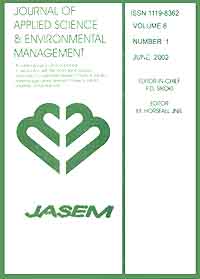
|
Journal of Applied Sciences and Environmental Management
World Bank assisted National Agricultural Research Project (NARP) - University of Port Harcourt
ISSN: 1119-8362
Vol. 24, No. 12, 2020, pp. 2131-2138
|
 Bioline Code: ja20305
Bioline Code: ja20305
Full paper language: English
Document type: Research Article
Document available free of charge
|
|
|
Journal of Applied Sciences and Environmental Management, Vol. 24, No. 12, 2020, pp. 2131-2138
| en |
Saccharomyces Cerevisiae  Tolerance to Hyper-Osmolarity in Aerobic Glucose-Limited Chemostat Culture Tolerance to Hyper-Osmolarity in Aerobic Glucose-Limited Chemostat Culture
Agbo, SO; Nebo, UC; Ogaugwu, CE & Van Tuijl, A
Abstract
Different mechanisms contribute to regulate cellular functions in order to cope with threats from physiological stress conditions. As a fundamental response to balance excess water loss and restore turgor, Saccharomyces
cerevisiae subjected to increased osmolarity accelerate intracellular glycerol biosynthesis and accumulation as a compatible solute. This study assessed cellular response to sorbitol-induced osmolarity in aerobic glucose-limited chemostat culture at various levels of the glycerol flux. Cell number declined slightly without any substantial increase in dry weight and total protein contents following exposure to 1M sorbitol that lasted for 90 min. On the other hand, total glycerol levels increased over time in different yeast cultivations corresponding with enhanced glycerol-3-phosphate dehydrogenase 1 (GPD1) transcript levels, which led to a steady and intensified protein product. These results support literature evidence of accumulated intracellular glycerol regulation at different levels and further increase curiosity to understand yeast tolerance in various applications including bakery, brewery and wine making or leavening of bread under
different osmotic conditions.
Keywords
Saccharomyces cerevisiae; glycerol; sorbitol; osmotic stress; chemostat
|
| |
© Copyright 2020 - Agbo et al
|
|
